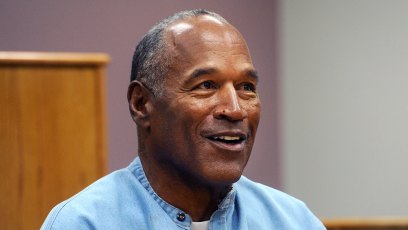
Ken McKay/ITV/Shutterstock
Sinead O’Connor Was ‘Withdrawn’ and Isolated in Her Final Days: She ‘Did Everything on Her Own Terms’
On July 17, nine days before her death, Sinéad O’Connor took to Twitter to express her grief over the January 2022 death of her son, Shane, who committed suicide at age 17. “Been living as undead night creature since. He was the love of my life, the lamp of my soul. We were one soul in two halves,” she wrote, giving fans an unflinching look at her troubled mental state. “He was the only person who ever loved me unconditionally,” she added. “I am lost in the bardo without him.”
Less than two weeks later, family members revealed that Sinéad — who was propelled into stardom with her 1990 hit song “Nothing Compares 2 U” and dealt her career a near-fatal blow by ripping up a photo of Pope John Paul II during a 1992 appearance on Saturday Night Live — had tragically died in her new London home at the age of 56. According to a source, loved ones had grown increasingly concerned about Sinéad in recent weeks. “There was a sense that Shane’s death wasn’t something she would be able to survive,” the source tells In Touch. “She was barely able to function.”
Her final hours were spent isolated and alone. “People close to Sinéad did their best to keep an eye on her, but it was an impossible task because she was so withdrawn and unapproachable,” reveals the source. “Sinéad did everything on her own terms — right up until the very end.”
Tumultuous Times
Much of the singer’s life was marked by struggles with mental illness, abuse and tragedy. In her 2021 memoir, Rememberings, she claimed her mother, who split from her dad when Sinéad was small, had abused her physically and emotionally when she was a child. “It was psychological, too. It was a torture chamber, really,” she said. At 13, she ran away to live with her father but was sent to an asylum for unruly women for 18 months. “I will never experience such panic and terror and agony over anything like I did at that place,” she revealed in a 1990 interview.
She was eventually diagnosed with bipolar disorder, post-traumatic stress disorder and borderline personality disorder, much of which she linked to her traumatic childhood. Struggling, she tried to kill herself on multiple occasions. In 1999 the mother of four (she shared Jake Reynolds with her first husband, John Reynolds, Roisin Waters with John Waters and Yeshua Bonadio with Frank Bonadio; Shane’s father was Irish singer Dónal Lunny) reportedly swallowed 20 Valium pills while embroiled in a custody battle with Roisin’s father. “I made a very serious suicide attempt, and I did almost die,” she confessed in 2005.
The loss of Shane last year was a devastating blow. “Sinéad was barely able to function after that,” says the source. “She fell into the deepest of depressions and openly admitted she was a shell of a human being with little left to live for. She just wanted to be with Shane.”
The Fame Game
Music was her savior, but Sinéad’s relationship to fame was an uneasy one. “There was no therapy when I was growing up, so the reason I got into music was therapy,” she said in the 2022 documentary Nothing Compares. “Which — it was such a surprise — I became a pop star. I just wanted [a space] to scream.” Her screams were a once-in-a-generation voice that could soar from a whisper to a howl. In 1990, “Nothing Compares 2 U” catapulted her to superstardom, but when it was nominated for four Grammy Awards, she boycotted the event, writing in an open letter that the academy “acknowledges mostly the commercial side of art.”
She refused record execs’ requests to grow out her shaved head and tone down her rebellious personality. When she was pregnant with her first child, she said, an exec encouraged her to have an abortion. Prince, who wrote the song that made Sinéad famous, once physically attacked her for cursing in interviews. “It seems to me that being a pop star is almost like being in a type of prison,” she said. “You have to be a good girl.”
She was anything but. She was shunned by the industry after tearing a photo of Pope John Paul II on Saturday Night Live to make a statement about the Catholic church’s cover-up of the sexual abuse of children. But she never saw that moment as the career-killer the industry did, rather, the reverse. “I feel that having a No. 1 record derailed my career,” she wrote in Rememberings, “and my tearing the photo put me back on the right track.” Ultimately, her allegations of abuse in the church was proven correct. Says the source, “When lawsuits against the church emerged years later, she felt vindicated.”
Still, the episode and others like it gave her a stigma. “It was very traumatizing,” she said. “It was open season on treating me like a crazy b—h.” Not that that ever stopped her. In later years she became a presence on social media, even as she became more reclusive (though in a recent post showing off her new digs, Sinéad hinted that she was planning on making new music). Still, says the source, she was far more interested in activism and using her voice for good: “Making a difference in the world gave her more satisfaction than reaching No. 1.”
Remembering Her
As news of her passing spread, celebrities including Melissa Etheridge, Jamie Lee Curtis, Outlander’s Caitriona Balfe, Jeffrey Dean Morgan, Ice T and Toni Collette expressed their sadness on social media. Russell Crowe shared an anecdote about meeting her outside a pub in Ireland in 2022. “I had the opportunity to tell her she was a hero of mine,” he tweeted. “What an amazing woman,” he added. “Peace be with your courageous heart Sinéad.”
Loved ones are devastated. “They are trying to stay strong. That’s what Sinéad would have wanted,” says the source. Police have yet to release the cause of death out of respect for the family, but there’s no suspicion of foul play. “Sinéad was a complex, flawed character but she was full of passion and fire and good intentions,” says the source. “Her talent was breathtaking but she was also human, and an incredible mother. Everyone is praying that she’s finally at peace.”
Have a tip? Send it to us! Email In Touch at contact@intouchweekly.com.





































